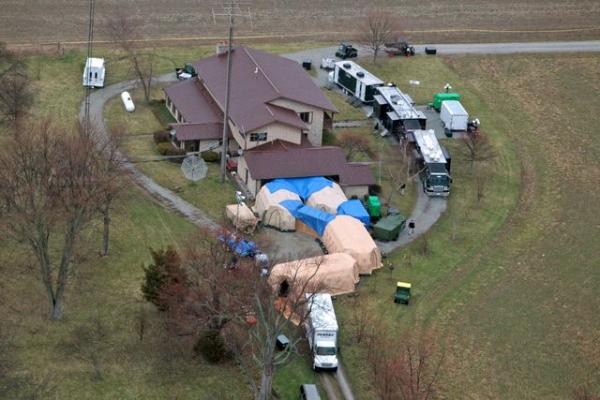
In this aerial photo taken from WTHR Chopper 13, FBI agents work around the home of 91-year-old Donald Miller in Waldron, Ind. on Wednesday, April 2, 2014. Authorities seized thousands of Native American, Russian, Chinese and other artifacts that have “immeasurable” cultural value from Miller’s private collection, the FBI said Wednesday. The items, which also came from Haiti, Australia, New Guinea and Peru, were collected by Miller over eight decades, FBI Special Agent Robert Jones said at a news conference.
Part One
The recent discovery by the FBI of a giant horde of Native artifacts and remains held by Don Miller in Rush County, Indiana offers an opportunity to take a deeper look into the eccentric, obsessive and sometimes shadowy world of such collecting.
Miller, 91, has been well known by as a collector of Indian and other artifacts for years. His collection includes the remains of over 100 Native ancestors, according to tribal leaders consulted by the FBI in the case. Many of the remains are labeled with names that can be traced to Native families alive today. “He had a head with an arrowhead stuck in it, like a skull and all kinds of Indian artifacts from arrowheads to hatchets to peace pipes to just anything,” neighbor Joe Runnebohm told the Indianapolis Star.
According to Drew Northern, FBI Supervisory Special Agent, the agency is reaching out to Tribal Historic Preservation Officers for assistance in repatriating items and remains found at Miller’s home. Within days of the find, the FBI coordinated a conference call and face-to-face meeting with THPO leaders at the Indianapolis office. “Building lasting relationships with tribes and repatriation is our goal,” Northern said.
Although early news reports described the FBI removal of the artifacts and remains from Miller’s home as a raid, later reports indicated that Miller is cooperating with authorities and had invited them into his home to take the items.

Although Agent Northern would not discuss how Miller came to the attention of the FBI, it seems likely that the collector may have been trying to sell or donate his artifacts. According to the Greensburg Daily News, Miller recently offered his collection to the Rush County Historical Society. Since the organization has limited space, leaders declined his offer.
Many of today’s natural history museums collections are based on donations from wealthy antiquarians wishing to leave personal legacies, says Christopher Moore, professor of Anthropology at the University of Indianpolis. “As colonial empires expanded in the 18th and 19th century, wealthy travelers would bring strange things back with them, often amassing huge collections that they displayed in their homes.”
This colonial practice continues today. Miller amassed his collection during 52 years of world travel as a missionary. He made no secret of his collection and frequently invited school groups and neighbors in to see his private museum, that included not only Native artifacts and remains but also cultural items from all over the world. A 1992 piece in the Indianapolis Star told the story of Miller and his personal museum.
Although some of the items in his collection may have been acquired illegally, no charges have been brought against Miller. Many of the artifacts were found by Miller during his travels, but he has so many items that it seems reasonable to assume he also bought or traded.
According to a Native artifacts dealer who asked to remain anonymous, Miller was a regular at artifact shows in the region.
Miller could not be reached for comment. Several prominent signs are currently posted along the property line of his Rush County home warning that trespassers will be prosecuted.
We may never learn complete details about Millers great horde and what drove him to amass it. His story, however, brings up tantalizing questions about those who are compelled to dig the earth in search of such treasures.
The subculture of artifact hunting, collecting, trading and selling spans an enormous spectrum from benign to bizarre, and involves a vast array of participants, from aging missionaries to meth heads.
Although the general public opinion regarding the legality and damage of digging for and collecting artifacts is slow to change, authorities are stepping up efforts to address this practice.
Bambi Kraus, President of the National Association of Tribal Historic Preservation Officers describes the FBI’s handling of the Miller case as a sea change for the agency. “This has never happened before that I know of, “ she said of the FBI’s decision to bring in tribes at the beginning of such an investigation.
“It was worth all those years of urging people to work with Indian tribes,” said Kraus.
Ben Barnes, second chief of the Shawnee tribe of Oklahoma, drove to Indianapolis to participate in the tribal consultation meeting with the FBI. He was impressed by agents’ displays of respect and concern especially regarding remains.
“The agents have been very active in making sure the ancestors are being taken care of; they are treating them respectfully and storing them in a special place away from other evidence.”
Past FBI investigations and seizures of Native artifacts have not ended as well such as the 2009 case in Utah.
One of those arrested during what then Interior Secretary Ken Salazar described as the biggest bust of Native artifact thieves, committed suicide. Residents of the region were outraged over what they described as heavy-handed tactics used by the FBI and the Bureau of Land Management, whose officers bust into suspects homes armed and wearing flak jackets.
Agent Northern did not respond directly to questions regarding the impact of the Utah case on the FBI’s handling of this case. “Our goal is to be as transparent,” he said, “mindful and respectful as possible and try to learn from what hasn’t gone well in the past.”
Read more at http://indiancountrytodaymedianetwork.com/2014/05/08/people-dirt-fbi-bust-remains-collector-hints-sensitivity-native-issues-154778?page=0%2C1


